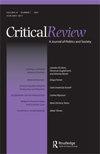福柯如何摆脱(专横的)马克思主义
IF 1.7
3区 社会学
Q4 POLITICAL SCIENCE
引用次数: 0
摘要
摘要福柯虽然在一个以马克思主义为主要参照系的环境中工作,但他与马克思主义保持着距离——离开了20世纪六七十年代的法国理论。通过将福柯置于当时法国马克思主义理论辩论的语境中,我们可以将他对马克思主义的批评与他对知识分子地位的讨论联系起来。福柯将马克思主义对待知识分子角色的标准方法视为适用于共产党的权力和知识问题。在他看来,马克思主义政党知识分子已经发展出了僵化和普遍的理论,并用它们来规定行动,这阻止了对他发现的各种问题的研究——尽管这些问题是资本主义发展的核心。本文章由计算机程序翻译,如有差异,请以英文原文为准。
How Foucault Got Rid of (Bossy) Marxism
ABSTRACT Foucault distanced himself from Marxism even though he worked in an environment—left French theory of the 1960s and 1970s—where Marxism was the dominant frame of reference. By viewing Foucault in the context of French Marxist theoretical debates of his day, we can connect his criticisms of Marxism to his discussions of the status of intellectuals. Foucault viewed standard Marxist approaches to the role of intellectuals as a problem of power and knowledge applicable to the Communist party. Marxist party intellectuals, in his view, had developed rigid and universal theories and had used them to prescribe action, which prevented work on the sorts of problems that he uncovered—even though these problems were central to the development of capitalism.
求助全文
通过发布文献求助,成功后即可免费获取论文全文。
去求助
来源期刊

Critical Review
POLITICAL SCIENCE-
CiteScore
1.30
自引率
12.50%
发文量
17
期刊介绍:
Critical Review: A Journal of Politics and Society is a political-science journal dedicated to advancing political theory with an epistemological bent. Recurrent questions discussed in our pages include: How can political actors know what they need to know to effect positive social change? What are the sources of political actors’ beliefs? Are these sources reliable? Critical Review is the only journal in which the ideational determinants of political behavior are investigated empirically as well as being assessed for their normative implications. Thus, while normative political theorists are the main contributors to Critical Review, we also publish scholarship on the realities of public opinion, the media, technocratic decision making, ideological reasoning, and other empirical phenomena.
 求助内容:
求助内容: 应助结果提醒方式:
应助结果提醒方式:


